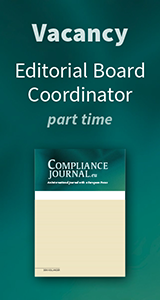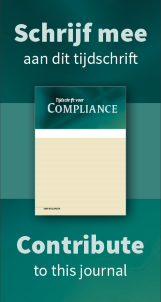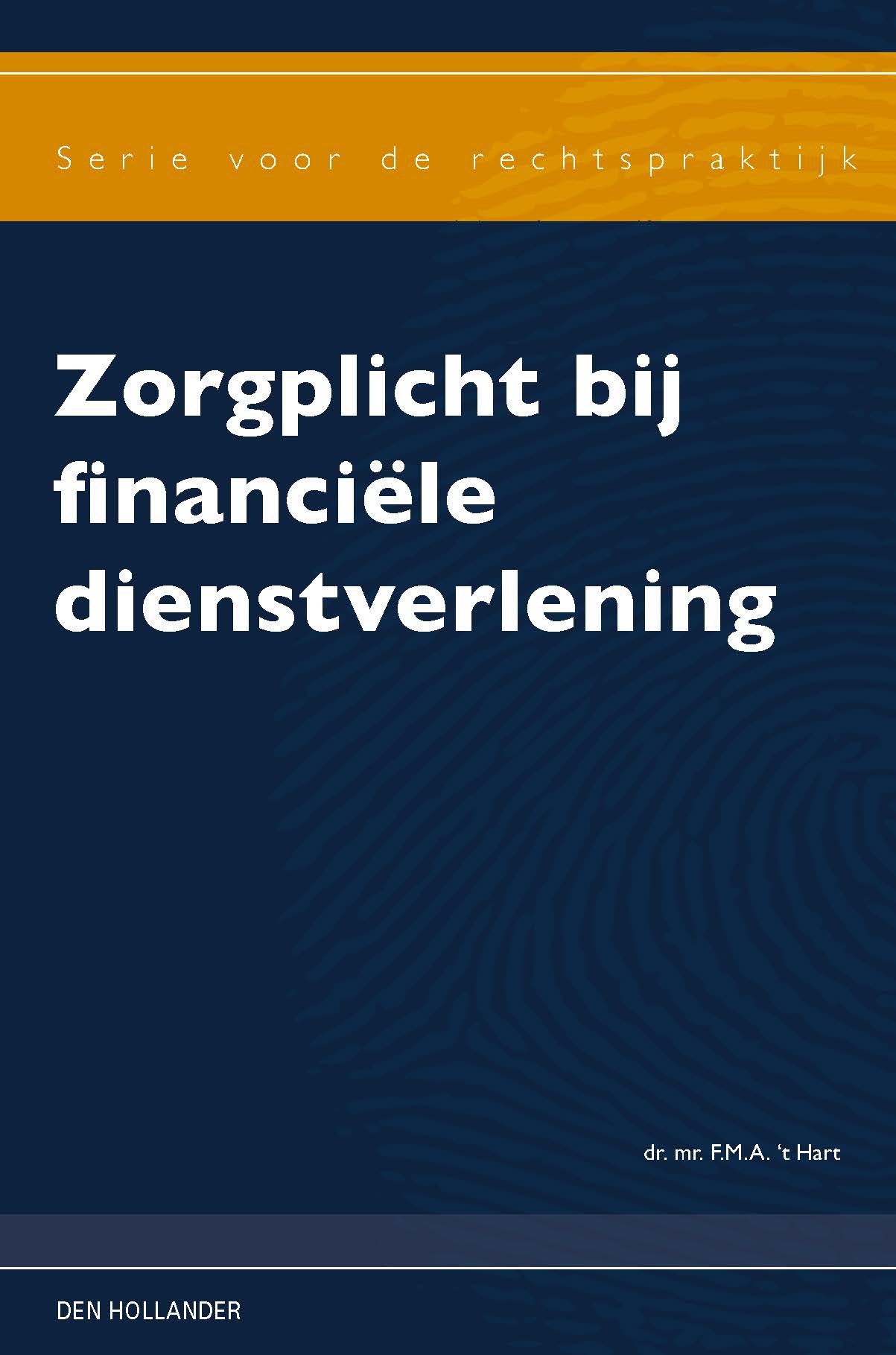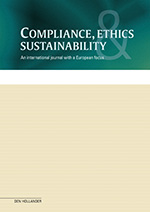Editorial
Het artikel is in de opmaak van het tijdschrift rechts als pdf beschikbaar.The fourth issue of 2022 focuses on 'ESG and Compliance'. A very hot topic these days, which is often in the news. But above all, it is a topical and interesting theme due to the fact that the public debate seems to be focusing more and more on the role of regulators, supervisors and private sector organizations when it comes to ESG norms. As ESG norms moves away from voluntary standards and is gradually being codified via rules and regulations and is gaining priority at management board level, the topic requires special attention of the compliance function in our view.
However, if we talk about ESG in this issue, where does this set of norms come from? The concept of "sustainable development" dates back to 1987 when the World Commission on Environment and Development (WCED), published a report entitled "Our common future". This document, also known as the "Brundtland Report", represents a call for a strategy in which economic development and the protection of the environment could be united. In this context, sustainable development was defined as the "development that meets the needs of the present without compromising the ability of future generations to meet their own needs". Since then, sustainability and its intergenerational nature has gained momentum. A milestone in this regard is represented by the adoption in 2015 of the United Nations Sustainable Development Goals (SDGs), which represent a call to protect people and the planet with 17 objectives to be met by 2030. The SDGs highlight the multifaceted dimension of sustainability which has to take count of the environment, social and governance factors (ESG). Over the course of the years, the attention for ESG matters have been increasingly regulated through hard law instruments, especially at a European level. A first important step in this direction is represented by the introduction of a Directive on Non-Financial Reporting (NFDR) in 2014, followed by the 2019 Regulation on Sustainability‐related disclosures in the financial services sector (SFDR), the 2020 Taxonomy Regulation and the recently presented Directive proposal on sustainability due diligence.
Considering the increasing demand of investors, society and consumers for reducing the adverse environmental and social impacts of economic activities, companies are progressively expected to integrate ESG aspects in their operations and to adapt the business strategy according to these objectives. In this issue, this complex topic is being discussed from different perspectives and for different sectors. With this issue on ESG we aim to illustrate the importance of ESG for the compliance function and provide compliance officers with an overview of possible attention points.
From Integrity-to ESG- Due Dilligence
Frank Erkens, Peter Jonker and Gilmar Ferreira da Cruz Catarrinho
The new requirements to perform ESG Due Diligence and report on impact of sustainability issues, will pose challenges for organisations, but also for compliance officers. The new regulations will lead to a shift in focus on financial performance to a broader management agenda, where ESG becomes of strategic importance. The many puzzling questions for the board room, where the company's values, business principles and code of conduct are put to the test, will have a serious impact on the compliance function.
Interview with Martijn Snoep: Klimaatverandering is het grootste marktfalen ooit
Jeroen Boogaard
The Netherlands Authority for Consumers and Markets (ACM) makes an active contribution to combating climate change through its role in enforcing EU and Dutch competition law. In this article Jeroen Boogaard is interviewing the chairman of the ACM Martijn Snoep about the approach and the ambition of the cartel watchdog when it comes to ESG.
SFDR: an important new focus area for the compliance function of asset managers
Roderik Boogaard
Sustainable investment is a fast-growing area of investment management. From a commercial perspective, asset managers often have an incentive to make disclosures to clients and investors which show that the financial products which they make available are "green". At the same time, such sustainability disclosures are subject to the ambitious new EU rules on disclosure as set out in the SFDR. In this article, Roderik will provide a summary overview of the SFDR and he also addresses certain attention points for the compliance function with respect to monitoring compliance therewith.
The Proliferation of Contractual Assurances in Environmental and Human Rights Due Diligence in Supply Chains
Martijn Scheltema
Contracts are regularly deployed to regulate corporate practices of suppliers in connection with- environmental and human rights compliance as required by buyers in supply chains. Many buyers, mainly western brands, consider this to be an important means to undertake environmental and human rights due diligence as envisaged by the United Nations Guiding Principles on Business and Human Rights (UNGPs) and the OECD Guidelines for Multinational Enterprises (OECD Guidelines). However, the current practices need improvement.
Een klimaatneutrale bedrijsvoering van de inkopende rijksoverheid: de compliancefunctie verkend
Mariska Verseveld and Willem Janssen
The Dutch central government often struggles to comply with sustainable public procurement rules and policy. Compliance with this framework of rules and policy measures is, however, important to reduce the impact of public procurement on the environment and to aid the fight against climate change. So far, little attention is given in the academic and public discourse to the role of an organizational compliance function to strengthen compliance levels. In this article, the potential of this function is explored and discussed.
ESG in Remuneration and Corporate Governance
Laurenz Goldhahn
As a PhD researcher, Laurenz Goldhahn investigated the importance of ESG in Remuneration and Corporate Governance. In his article Laurenz explains the role of remuneration schemes as an ESG incentive framework and highlights underlying trends in regulation and investing. It differentiates ESG activities based on their role in corporate governance, shows the role of remuneration as an ESG decision-making incentives, and illustrates the role of regulators and investors, especially large index funds, as key external drivers in this relationship.
A reflection on the flaws of social audits
Priscilla Robledo, Clean Clothes Campaign
Auditing companies are commercial enterprises that meet their clients' needs to manage their reputation. Created in response to the criticism raised by the numerous abuses reported in the 1990s, corporate-led social responsibility systems have shown all their limitations, which can be summarised as a lack of transparency, conflict of interest, and the inconsistency of the tools set up to identify, manage and remedy violations or risks of human rights abuses. This is evidenced by the questionable amount of real improvements in working conditions at global level achieved with these initiatives. The article taps into the expertise of the Clean Clothes Campaign, which has long been raising awareness about flaws of social audit and the responsibilities of auditing companies, highlighting that social certifications are in no way a substitute for the due diligence on human and labour rights in the supply chain.
De rol van de Nederlandse financiële sector in de bestrijding van illegale handel in wilde dieren
Bente Kloth
Bente Kloth is writing about illegal wildlife trade (IWT) to create awareness at financial institutions about this global problem. IWT is the fourth largest type of crime in the world after arms, drugs and human trafficking. Just as any other (serious) crime IWT goes hand in hand with criminal organized networks and money laundering. In her article she further investigates the topic and provides practical guidance for financial institutions to integrate IWT in their AML/CFT framework.
Uit de boekenkast van de bedrijfsethiek (84)
Edgar Karssing
Many books and articles have been published in business ethics in which integrity issues are dealt with in a practical manner and which make concrete recommendations for promoting the ethics and integrity of organizations and their employees. Not everyone knows where to find these publications or has the time to read them. That is why Edgar Karssing regularly looks in the business ethics bookshelf for het Tijdschrift voor Compliance and discusses an article or book. These contributions are not reviews, but a summary of the main conclusions and recommendations of the author(s), which he will confront with his own observations as a researcher, trainer and advisor in the field of ethics and integrity.
This issue discusses two articles 'Toen was cultuur heel gewoon. Op zoek naar balans in het sturen op cultuur en gedrag' written by Olof Bik and 'IDEO's culture of helping' written by Teresa Amabile, Colin Fisher and Julianne Pillemer.
In short, food for thought for the compliance function. The editorial team wishes you a lot of reading pleasure.
Arend Koper, Maria Pia Sacco & Annemarije Schoonbeek




